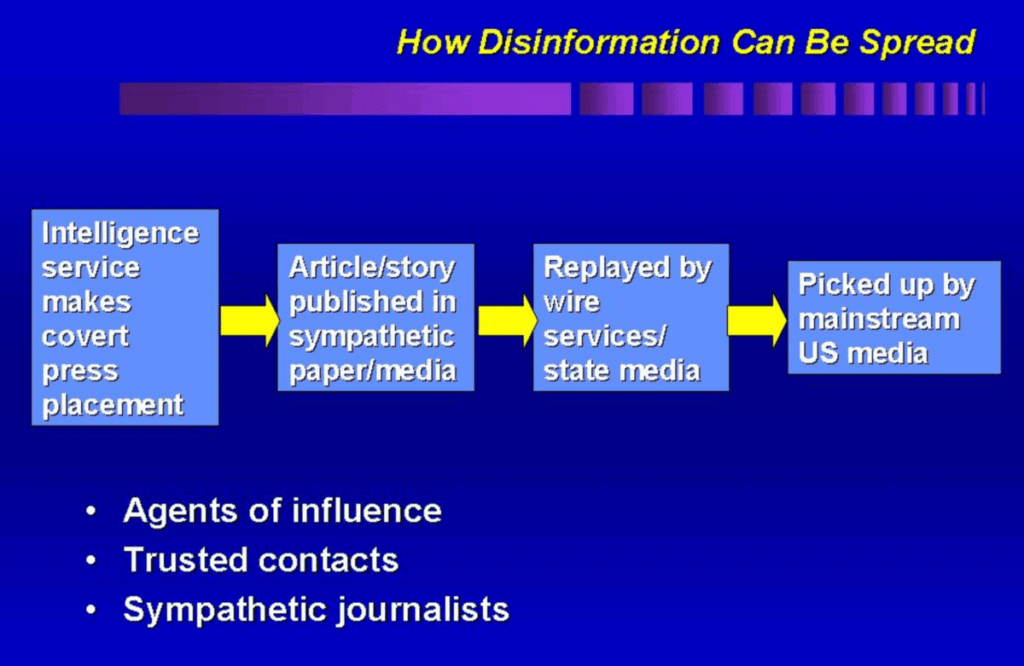Disinformation vs misinformation: Clearing up major errors in the debate

A US Department of Defense slide from 2001 diagrams the disinformation process.
Among the many issues clouding the debate about Russian disinformation is the terminology that self-styled experts use.
Many journalists, policy shops, consultants, and government officials use “disinformation” interchangeably with “misinformation.” This is an error of carelessness or ignorance that harms public understanding of a serious problem.
“Disinformation” is the English literal translation of the Russian term “dezinformatsiya” (дезинформация), coined by the Soviet Communist Party to refer to deliberate falsehoods manufactured for the purpose of pushing certain propaganda lines or policy objectives abroad.
The Soviets implemented their disinformation campaigns abroad through Service A of the First Chief Directorate of the KGB. Service A was the foreign intelligence unit that executed Soviet active measures abroad alongside the Soviet Communist Party Central Committee’s International Department.
“Misinformation,” on the other hand, is an Americanized attempt to define false or inaccurate information that is not intended to deceive, but simply mistaken information. It is not a translation of a Russian operational term.
When self-styled authorities about Russian disinformation make the repeated mistake of calling it “misinformation,” they give a clue that they aren’t authorities at all.
Report to Senate intelligence committee is full of erroneous terminology
A recent private report for the US Senate Select Committee on Intelligence repeatedly made the mistake.
“Russia’s Internet Research Agency (IRA) launched an extended attack on the United States by using computational propaganda to misinform [sic] and polarize US voters,” the report said in the first sentence of its executive summary.
The campaign was allegedly responsible for “spreading sensationalist, conspiratorial, and other forms of junk political news and misinformation [sic] to voters across the political spectrum,” the report said.
“Russia’s Internet Research Agency (IRA) began targeting US voters for misinformation [sic] as early as 2012, using some of the techniques it had employed on its own citizens and those of neighboring countries in Eastern Europe,” according to the report.
Later, the report used the terminology correctly: “The IRA adapted existing techniques from digital advertising to spread disinformation and propaganda by creating and managing advertising campaigns on multiple platforms, often making use of false personas or imitating activist groups.”
State Department, which once got it right, got it wrong
Even the US State Department, which had published important reports with the CIA on Soviet disinformation and active measures in the 1980s, has gotten it wrong.
Under the George W. Bush administration, the State.gov website’s modest little page on Russian disinformation got changed to “misinformation.” That link is now dead: Secretary of State Hillary Clinton’s team removed the page entirely in 2009. The Wayback Machine shows that the page existed from 2005-2009.

Where to find accurate information on the term ‘disinformation’
The best sources of accurate information on the term “disinformation” come from the Soviet-bloc defectors who first brought the issue to the West’s attention. Ironically, their warnings were unheeded – and often scorned – in establishment outlets like the New York Times and Washington Post because they discredited some of the prevailing narratives of the time.
For authoritative information, see Czechoslovakian intelligence defector Ladislav Bittman’s The KGB and Soviet Disinformation: An Insider’s View (Pergamon, 1985). Bittman, who died last year at age 87, was this writer’s graduate professor at Boston University.
A superb secondary study, Dezinformatsia: The Strategy of Soviet Deception, by Richard H. Shultz and Roy Godson (Berkley Reprint, 1986) is an unsurpassed historical work.
- I infiltrated radical groups 40 years ago. Leftists are desperate for martyrs - February 6, 2026
- Chinese spies ‘sham marriage’ scandal exposes ‘targeted’ national security threat at major US base: Waller - January 27, 2026
- The “Donroe Doctrine” In Action - January 7, 2026
